Using app-based two-factor authentication on a smartphone is more effective than depending on passwords when protecting user information. However, this process can still be time-consuming to set up and use. Security keys provide a whole new level of privacy and security for users’ business and personal devices, bringing physical two-factor authentication protection that can lock down users’ devices. However, some online accounts might contain sensitive information that requires users to take extra security steps.

A security key is a device that enables stronger authentication in accessing online systems, applications and other devices. The best security keys are affordable, easy to use and more secure than SMS-based two-factor authentication. A security key also supports U2F and FIDO2/WebAuthn and comes in USB-C and USB-A form. A USB security key protects users against imposter sites that try to steal login credentials to private accounts like emails and social media platforms.
The best security keys for online protection are given below.
- Best for Mobile: YubiKey 5Ci
- Best Value: FIDO U2F Security Key
- Best Compatibility: Google Titan Bluetooth Security Key
- Best for Laptop: SoloKeys USB-C
- Ultimate Security Key: CryptoTrust OnlyKey
- Best Overall: YubiKey 5 NFC
- All-In-One: HyperFido K18
- Best for Mobile Devices: Yubico 5Ci
- Best for Windows: Kensington VeriMark Guard USB-C Fingerprint Key
Table of Contents
1. YubiKey 5Ci
The is one of the best dual connector security keys that is designed to act as a unified security solution across both mobile and desktop devices. This key can be used as a protected login key or to set up fast two-factor authentication. YubiKey 5Ci offers security that decreases the potential for password-based account hijacking.
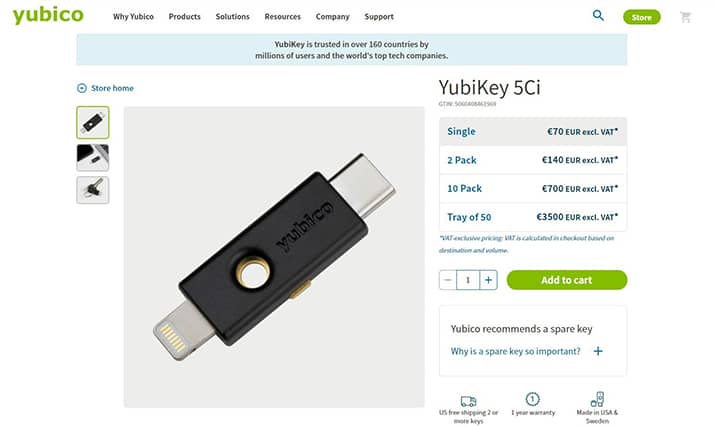
YubiKey 5Ci’s features include quick and easy authentication, security for all major operating systems and browsers, multi-protocol support, a lightning adapter for iPhone devices and USB-C on a single key. This key provides an added element after logging in with a username and password, similar to a second-factor token sent via a message or generated by an authentication application like Google Authenticator. The price of YubiKey 5Ci is around $70 each.

YubiKey 5Ci supports the new WebAuthn protocol approved by the W3C to allow powerful, encrypted second-factor authentication within a browser without needing proprietary extensions or company-specific software or hardware. This key provides premium security by combining hardware-based authentication and public key cryptography to protect against phishing attacks and eliminate account takeovers efficiently. YubiKey 5Ci also provides the FIDO2/WebAuthn protocol to protect user privacy against hackers.
The advantages of YubiKey 5Ci include USB-C connections to PCs, a lightning connector that works efficiently with all iOS devices, support for market-standard WebAuthn for web logins and highly customizable with advanced options. On the other hand, the disadvantages are that this key is a bit expensive, has limited support for Apple, has a very stiff USB-C plug and has no NFC. This key helps businesses accelerate to a passwordless future by supporting the FIDO2 protocol.
To activate YubiKey 5Ci, put the key into the USB port. Once plugged in, the YubiKey 5Ci should show a blinking light. If the key is not blinking, try plugging the key into a different USB port. Once a blinking light appears, press the gold disk in the middle of the key. The unique features of YubiKey 5Ci include fast authentication, an intuitive user experience, quick setup and deployment, integration with systems tailored for all types, and reduced help desk tickets for password resets.
2. FIDO U2F Security Key
The is another top security key that gets users into the hardware two-factor game at an affordable price. This key is compatible with the U2F protocol and works efficiently with the newest Chrome browser and various operating systems such as macOS, Linux and Windows. As the name suggests, the FIDO U2F Security Key is FIDO U2F-certified, allowing two-factor support for sites like Google, Dropbox and Facebook. However, unlike other security keys, this product does not support email apps and is limited to just the U2F protocol.

FIDO U2F Security Key’s features include FIDO U2F authentication, ECDSA with P-256, privacy protection and a user-friendly design. The key also features a durable aluminum frame that protects users’ two-factor passwords from common events like drops and bumps. The keys are specially designed with a 360-degree rotating metal cover that shields the USB connector when not in use. The FIDO U2F Security Key costs about $23.99 each.
The advantages of the FIDO U2F Security Key include open-source firmware and hardware, affordable prices, and support for U2F and FIDO2 protocols. On the other hand, the disadvantages of the FIDO U2F Security Key are that the key does not support other two-factor authentication methods, has no wireless support and lacks other unique features.

To use the FIDO U2F Security Key, insert the key into the PC’s USB port and press the button when prompted. Users will be able to enter a name for the key afterward. Tick “set up two-factor authentication” to require the security key to sign in when a user is done. This key allows users to securely access any website or online service supporting the FIDO U2F authentication protocol using a single device. Insert a USB token into any port, then press the U2F token button and input the password to authenticate with the key. This key is water-resistant, safe and fits nicely on a keychain with a car and home keys.
3. Google Titan Bluetooth Security Key
The Google Titan Bluetooth Security Key is one of the top protected security keys that provides an added layer of security for users’ online accounts. The key works perfectly with tablets, phones and PCs over Bluetooth, NFC or a classic micro-USB connection. Even though the key comes from Google, the Google Titan Bluetooth Security Key is not limited to just Google services as the key supports the FIDO U2F standard, so users can authenticate with various apps and services. The key costs around $30.
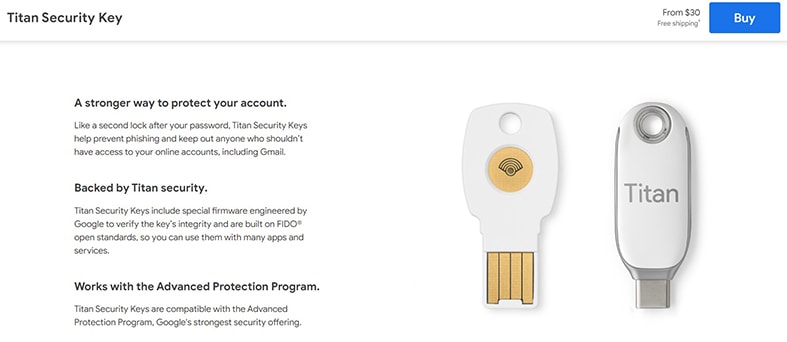
Google Titan Bluetooth Security Key provides cryptographic proof of users interacting with various legal services with registered security keys. This key’s hardware chips are specifically designed to resist physical attacks which may remove secret key material and firmware. Google Titan Bluetooth Security Key is suitable with Google’s advanced protection program that helps protect users from cyberattacks.

This key includes one USB key and one Bluetooth key. Users can also get a short charging cable for the Bluetooth key, plus a USB-C adaptor. The Google Titan Bluetooth Security Key comes with a Bluetooth-powered key fob that shows authentication and charging status. The key is FIDO U2F certified and provides a robust anti-phishing two-step authentication method. If a user has private data on social media accounts and needs extra security, Google Titan Bluetooth Security Key is the best choice.
The advantages of Google Titan Bluetooth Security Key include secure two-factor authentication, easy integration with Google, a battery-free USB key and a Bluetooth key that connects to both computers and phones. However, the main drawback is that this key has limited device compatibility.

To register Google Titan Bluetooth Security Key with a Google account, users need to visit Google’s setup page in a desktop browser and follow the instructions. The registration process is simple and generally takes under a minute to complete.
When using Google Titan Bluetooth Security Key, the process is no different from receiving a code or pop-up on another device when signing in to a Google account. To use this key, open the web browser on a PC or phone, then sign in to a Google account. When prompted, follow the steps to authenticate a user account using the Google Titan Bluetooth Security Key. If a user sees a message from Google Play Services, click OK. Turn on the key and click on the gold disc. This procedure will have to be repeated whenever a prompt appears on the user’s device to provide a second form of authentication when logging into a Google account.
4. SoloKeys USB-C
SoloKeys USB-C is the latest security key that works with all major two-factor authentication setups, including FIDO2/WebAuthn. Users can use the key with Google products, Dropbox, Okta, Facebook and Microsoft accounts. This key is an open-source alternative to Google Titan Bluetooth Security Key. SoloKeys USB-C is ideal for users who are concerned about privacy and security and need a detailed layout of how the software is working.
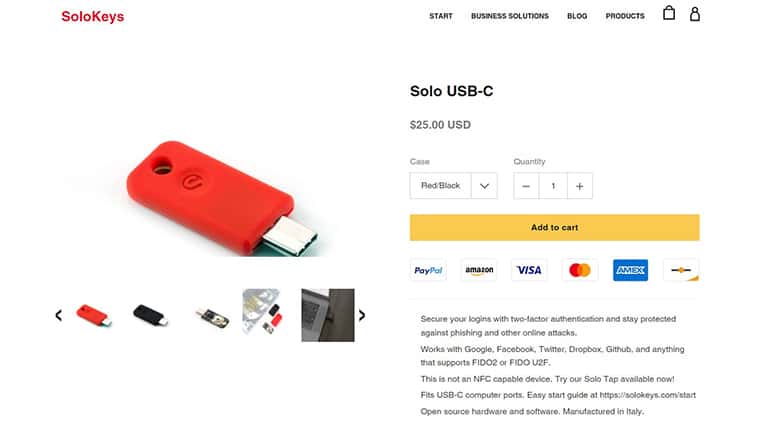
SoloKeys USB-C supports signed firmware updates, so users can soon add new features like OpenPGP, static password and cryptocurrency wallet features. The features of SoloKeys USB-C include FIDO U2F authentication, privacy protection and a user-friendly design. The key supports the new FIDO protocol so that users will get a powerful, secure login with protection against account takeovers, phishing and other internet attacks. SoloKeys USB-C costs around $25 each.
The advantages of SoloKeys USB-C include OTP support, FIDO U2F compliance, connections to Android devices and PCs, and support for market-standard WebAuthn for web logins. On the other hand, the disadvantages of SoloKeys USB-C include no GPG, no password and no NFC.
To register for SoloKeys USB-C, log in to the website, find the security settings and then enable two-factor authentication if required. Then, follow the instructions to register the SoloKeys.
5. CryptoTrust OnlyKey
is an open-source security key that is PIN-protected, offering a solution in situations where users lose access to online accounts. This key keeps social media accounts safe if a PC or website is compromised. CryptoTrust OnlyKey also supports multiple two-factor authentication methods, including FIDO2 U2F, Yubico OTP and TOTP. The key features a self-destruct function, encrypted backup capabilities and the ability to update the firmware to access new features.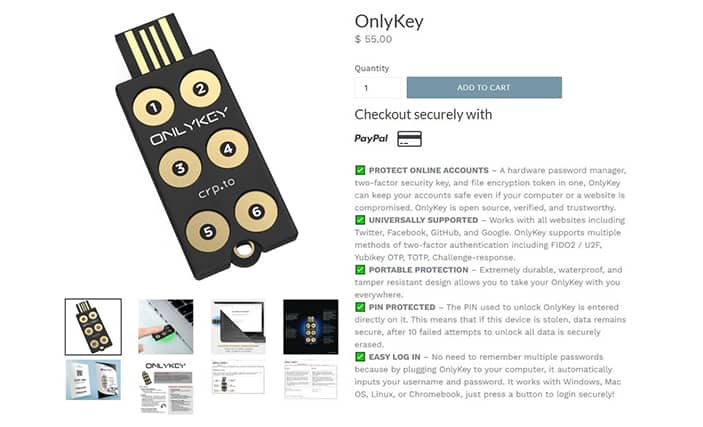
CryptoTrust OnlyKey adds a few features that are missing from competitors. If a PC or site is compromised, the key’s onboard keypad can ensure that online accounts are kept safe. The key provides firmware updates so that users can access new features. While most security keys have one activation button, CryptoTrust OnlyKey has size buttons. Each button adds an added layer of security, offering users extra options and steps to deck out a user’s security system with several different password mechanisms. The price of the CryptoTrust OnlyKey is $55.
The advantages of CryptoTrust OnlyKey include PIN protection and a password management feature. However, the key has a poor user interface and is not as compact as rivals.

CryptoTrust OneKey can store a maximum of 24 passwords, usernames, OTP accounts and URLs. This key provides users with more security with the FIDO2 U2F authentication protocol. The encrypted backup and self-destruct features are unique to this key, and the product allows users to bypass keyloggers that may be installed on a PC. With this USB key, users can protect all online accounts, even when an online service has been compromised.
To set up CryptoTrust OnlyKey, open a text editor such as Notepad or TextEdit. Click inside the text editor, insert the CryptoTrust OnlyKey into the USB port on the PC, hold button #3 on the key for five seconds and then release. When the quick setup completes, users will see the text “setup complete.” Make sure to write down the PIN and backup passphrase and store this in a secure location. When finished, enter the PIN on the key to start using the new device.
6. YubiKey 5 NFC
is another excellent security key that works efficiently with both USB-A and USB-C ports and Near Field Communication. The key also supports many authentication protocols beyond the FIDO U2F and FIDO2/WebAuthn. The YubiKey technology uses many security keys that support the FIDO U2F authentication standard. The key works with NFC and is compatible with services like Dropbox, Google Chrome, 1Password, LastPass and Facebook. In addition to being durable and lightweight, the YubiKey 5 NFC is also waterproof. The features of YubiKey 5 NFC include a broad ecosystem, easily configurable multiple protocols on NFC-enabled Android phones and OpenPGP protocol support.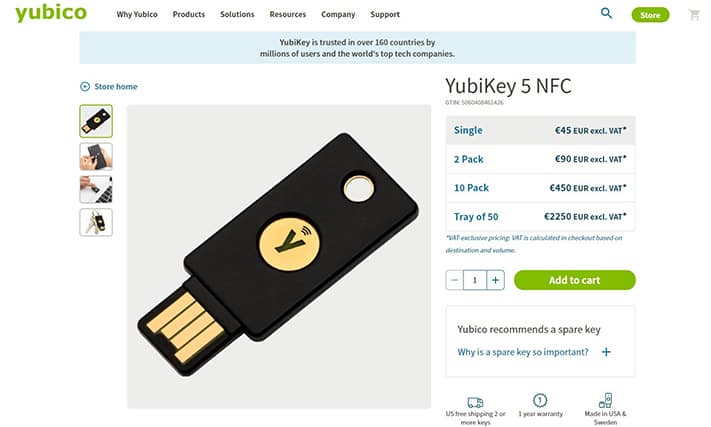
YubiKey 5 NFC supports authentication protocols such as FIDO U2F, Smart Card, Yubico OTP, OpenPGP and OATH-HOTP. This key works efficiently with Android and iOS, so YubiKey 5 NFC has more usability than the average USB key. The key offers an intuitive authentication experience that users find easy to use and ensures organizational security and quick adoption. The features of YubiKey 5 NFC make the key ideal for people who need to manage various services with a single key or wish to protect individual internet browsers and operating systems.

The advantages of YubiKey 5 NFC include water-resistant material, support for both USB-C and NFC, various advanced features and use of the FIDO U2F standard. On the other hand, the disadvantages of Yubikey 5 NFC are that the key is a bit expensive and has spotty support from websites and other services.
YubiKey 5 NFC is FIDO-certified, meaning the key works with Chrome and any FIDO-compliant app on macOS, Linux or Windows. The key also has the ability to provide users with strong hardware-based authentication. The price of the YubiKey 5 NFC is around $45.
To use YubiKey 5 NFC, open Google Chrome on Android and navigate to GitHub. When logging in, make sure to choose the security key option. When a user clicks on the “use security key” button, a series of configuration prompts will appear. The first prompt is a start wizard; choose how to use the security key by selecting “Use Security Key with NFC” to continue. The last step is to authorize the request, so click YubiKey 5 NFC against the device one more time.
7. HyperFido K18
is one of the toughest security keys in the market, constructed with an indestructible titanium metal chassis that attaches to a keychain. The key also features a single button and LED to indicate active status. This key improves hardware security when a user connects through the USB port while reducing the dependence on passwords. With HyperFIDO K18, users do not need to use passwords that may be easy to hack. The features of HyperFIDO K18 include support for HOTP, FIDO2 and FIDO U2F protocols, enhanced security and the ability to combat attacks.
HyperFIDO K18 can resist live intrusions, such as man-in-the-middle-attacks, traditional phishing attacks and hacking. There is no administration cost for managing authentication support with this key. The key supports the FIDO U2F protocols such as Twitter, Gmail, Facebook and Dropbox. HyperFIDO K18 costs around $42.99.

The advantages of HyperFIDO K18 include total security, ease of use, affordability and a near-indestructible build. On the other hand, the disadvantage of HyperFIDO K18 is that this key lacks NFC authentication. The key provides both six-digit and eight-digit OTP codes and can be easily programmed using the OTP tool. HyperFIDO K18 works with any web app that supports the FIDO U2F protocol, and users just need to press the button on the key to finish signing in. This key uses standard public key cryptography methods to offer strong authentication.
To manage HyperFIDO K18, open the settings on the Windows device and then tick “accounts.” Go to the sign-in option, tick the security key and then tick manage. Insert the key into an available USB port. When prompted, press the button on the key. Under the security key PIN, tick “Add.” Enter and confirm the PIN, then tick “OK” to finish adding the security key. If a user wants to change the PIN, go to the sign-in option. Click on “Security Key” and then “Manage.” Under the PIN, tick “Change,” then enter a current and new PIN. Tick “Ok” to confirm the changes.
8. Yubico 5Ci

Just like a two-factor token sent via message or generated by an authentication application, this key provides an added element after logging in with a username and password. This key is FIDO-certified and works efficiently with Google Chrome and any FIDO-consistent app on macOS, Linux or Windows. YubiKey 5Ci protects users’ Gmail, Dropbox, Outlook, LastPass. Dashlane, Facebook and 1Password accounts. The features of Yubico 5Ci include FIDO U2F, FIDO2, Yubico OTP, OATH-HOTP, smart card and OpenPGP support, along with a challenge-response capability providing powerful hardware-based authentication.
The key is specifically designed to secure user accounts from phishing and account takeovers. The key is ideal for users of iOS and Mac devices. However, the Yubico 5Ci is thicker than the YubiKey 5 NFC and other competitors. The price of Yubico 5Ci is around $70 each.

Yubico 5Ci’s advantages are that the key offers a USB-C connector for Android and PCs, OTP support and a lightning connector. The FIDO U2F-compliant key is also durable and highly customizable with advanced options. On the other hand, the disadvantages of Yubico 5Ci are that this key is a bit expensive, has no NFC protocol and has a very stiff USB-C plug.
To use the Yubico 5Ci key, place the key into the USB port. Once plugged in, the key should show a blinking light. If the Yubico 5Ci is not blinking, try plugging the key into a different USB port. Once the blinking light appears, press the golden disk in the middle of the key. With that, the hardware two-factor authentication key is activated. The next time a user tries to log in to Facebook, instead of using a passcode to verify the identity, the user will be asked to insert the Yubico 5Ci and press the golden button.
9. Kensington VeriMark Guard USB-C Fingerprint Key
is one of the latest security keys providing expanded authentication options for FIDO2 biometric authentication services. The key offers strong single-factor, dual and multifactor support, making the product the best biometric authentication key on the market. This key tends to be used with up to 10 fingerprints so that various customers can sign in to the same computer.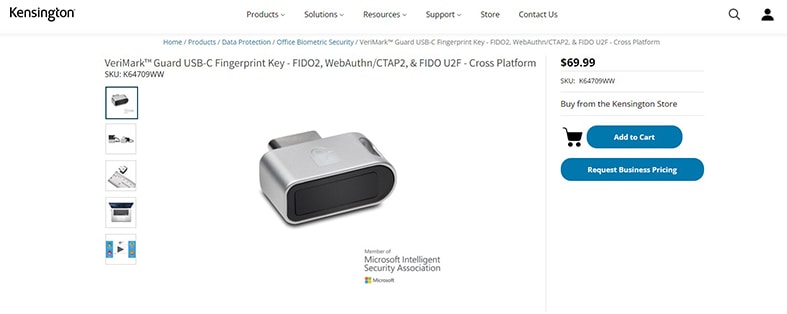
Kensington VeriMark Guard USB-C Fingerprint Key is FIDO U2F-certified so that users can secure cloud-based accounts. The key offers unique finger impression technology to enhance biometric execution. The key’s features include cross-platform compatibility, FIDO U2F-certified, biometric and security key authentication, encrypted end-to-end security with advanced fingerprint technology, and GDPR and TAA compliance.

The advantages of the Kensington VeriMark Guard USB-C Fingerprint Key include an integrated fingerprint sensor, a small and well-built design, and support for most popular multifactor standards. On the other hand, the disadvantages of the Kensington VeriMark Guard USB-C Fingerprint Key include confusing onboarding, no NFC protocol, no indicator for when biometrics are in use and issues with biometrics not being widely supported. The price of the Kensington VeriMark Guard USB-C Fingerprint Key is around $69.99.
The key’s fingerprint reader with advanced technology combines superior biometric performance, 360-degree readability and anti-spoofing protection. Kensington VeriMark Fingerprint key protects users’ cloud-based accounts such as Dropbox, GitHub, Google and Facebook with FIDO second-factor authentication.
Users can log in to a Windows PC using Microsoft built-in Windows Hello login features with just a fingerprint. Users do not need to remember usernames and passwords. This product can be used to store up to 10 different fingerprints so that multiple users can log in to the same PC with this security key.
What are the Best Security Keys’ Mutual Features?
The best security keys’ mutual features are listed below.

- FIDO U2F-Certified: This feature offers better and simpler security for internet services so that users will no longer lose online accounts through password theft, hacking or phishing attacks. The FIDO U2F Security Key is compatible with the U2F protocol and works perfectly with the newest Chrome browser and various operating systems such as macOS, Linux or Windows.
- Protect User Privacy: The best security keys will not store or read any information from users’ PC or online accounts. The embedded memory of the security key only stores the paired public and private keys generated by the local system. YubiKey 5Ci uses the FIDO U2F protocol to protect user privacy efficiently against hackers.
- User-Friendly Design: The best security keys include an easy-to-click button, along with a functioning indicator light, and can easily attach a keychain. SoloKeys USB-C offers an easy-to-use interface and helps the user securely log in with protection against account takeovers and phishing attacks.
- Highly Durable: The best security keys are designed with a 360-degree rotating metal cover that shields the USB connector when not in use. These keys are crafted from a durable aluminum alloy to protect the keys from scratches, bumps and drops. YubiKey 5 NFC is highly durable, lightweight and waterproof.
- Configurable: These security keys can easily configure multiple protocols across networks, PCs, online apps and services. YubiKey 5 NFC provides easily configurable protocols on NFC-enabled devices.
- Multi-Protocol: The keys also support FIDO2, FIDO U2F, Smart Card, OTP, OpenPGP, WebAuthn and challenge-response systems. YubiKey 5Ci provides multi-protocol support to protect users from cyberattacks.
What is the Smallest Security Key for Online Protection?
The Kensington VeriMark Guard USB-C Fingerprint Key is the smallest security key for online protection that offers superior defense against phishing attacks, eliminates account takeovers and allows compliance requirements for powerful authentication. The size of the Kensington VeriMark Guard Fingerprint Key is 20.8mm, and Yubico 5Ci is the second smallest security key for online protection.
Why is USB-C Connection Important while Choosing a Security Key?

USB-C connection is a relatively new way to deliver data and power to and from computing devices. Because the USB-C plug is symmetrical, the key can be inserted either way, eliminating the frustrations of earlier USB ports and putting the key on a par with Apple’s reversible Lightning plug. USB-C connection is closely linked to several robust technologies, including USB Power Delivery and Thunderbolt. USB-C connection provides up to double the transfer speed of USB 3 at 10 Gbps. While USB connectors are not backward compatible, the standards allow adapters to be used with older devices. With USB-C authentication, the key would be an obstacle for hackers to attack new devices. This USB-C authentication program could protect a user’s laptop or desktop from malicious USB drives in the same way any antivirus app protects a user’s PC.
What is the Average Price for the Best Security Keys for Online Protection?

The minimum and maximum prices for the best security keys for online protection could vary between $20 and $70. The average price for the best security keys is around $40 each. Pricing factors depend on ease of use and reliability, support for multi-protocols, systems and services. YubiKey 5Ci is the most expensive security key on the list, while the FIDO U2F Security Key is the cheapest option that reduces password support incidents.
Are Military-grade Security Keys More Expensive?
No, military-grade security keys are not expensive. The above-mentioned security keys are among the most protected keys users can purchase, thanks to military-grade authentication and other features. Using a security key as a form of two-factor military-grade authentication is an easy method for locking down user accounts.
What does FIDO Compatible Mean for Security Key Quality?
FIDO compatibility is where security and user experience meet. FIDO is a collection of security specifications for powerful authentication. FIDO supports multifactor authentication and public-key cryptography. FIDO also supports UAF and U2F protocols to create a new key pair during registration with an online service and retains the private key. FIDO also stores personally-identifying information, such as biometric authentication data, on the user’s device for enhanced protection. The YubiKey 5Ci, for example, is highly compatible with FIDO to support multifactor authentication and protect users against cybercriminals.
Can a Security Key be Hacked?
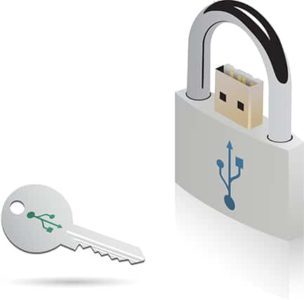
No, security keys cannot be hacked traditionally, but the keys can be lost or stolen. A commonly used hacking definition is compromising online accounts and networks through unauthorized access to users’ accounts or PCs. The keys can also be broken, which should not lock users out of any account but is undoubtedly a setback. Security keys can be used with two-factor authentication to help users keep hackers out of online accounts, even if cyber attackers have stolen critical information like passwords. Users can set up the phone’s built-in security key to securely sign in on Chrome OS, macOS and Windows 10 devices. Encryption technology is a random string of bits generated to scramble and unscramble data. Security keys use encryption technology to ensure that each key is unpredictable and unique.
Can Security Keys be Used for Cybersecurity in Companies?
Yes, security keys can be used for cybersecurity in companies to protect against cyberattacks. Many industries need cybersecurity to protect all categories of information from damage and theft. This includes private information, protected health information and governmental and market information systems. Google, Facebook, Instagram, Twitter, Dropbox and Epic Games use security keys to protect employee accounts and end-user accounts.

